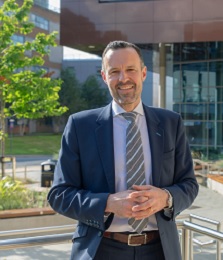Professor Tim Underwood BSc (Hons), MBBS, PhD, FRCS (Gen. Surg)
Professor of Gastrointestinal Surgery

- Related links
Professor Tim Underwood is Cancer Research UK & Royal College of Surgeons of England Advanced Clinician Scientist Fellow within Medicine at the University of Southampton.
Tim Underwood is Professor of Gastrointestinal Surgery and Head of Cancer Sciences Academic Unit at the University of Southampton. He trained in London and the Wessex region before completing a PhD in Molecular Biology and taking up an NIHR Clinical Lectureship in Surgery in 2008. In 2011 he was awarded a Medical Research Council Clinician Scientist Fellowship and in the same year he won the Association of Surgeons of Great Britain and Ireland prize and gold medal for outstanding performance in the Intercollegiate Specialty Examinations (General Surgery). He became a Cancer Research UK & Royal College of Surgeons of England Advanced Clinician Scientist Fellow in April 2017.
Professor Underwood leads a programme of research studying the role of the tumour microenvironment in cancer development and progression with a particular interest in oesophageal cancer and tumour ecology. His team focus on understanding the molecular determinants of response to chemotherapy and the development of new therapies that target the tumour microenvironment to enhance the efficacy of conventional treatments. Developing themes include the regulation of antigen presentation in oesophageal cancer and the influence of exercise on response to chemotherapy and the tumour microenvironment across tumour types. His team develop and apply advanced technologies to understand tumour complexity in oesophageal cancer including highly parallel genome-wide expression profiling of single cells using nanoliter droplets (DropSeq) and the generation of multicellular organoid models.
Professor Underwood is a member of the National Cancer Research Institute (NCRI) Upper GI Clinical Studies Group and Oesophagogastric sub-group. He is a member of the Steering Committee of the Oesophageal Cancer Clinical and Molecular Stratification (OCCAMS) consortium, a UK-wide collaboration that is defining the genetic landscape of oesophageal adenocarcinoma, including a new molecular classification. He has a portfolio of clinical trial activity in upper GI cancer.
Tim works nationally on behalf of the Royal College of Surgeons of England as Genomics Champion and Site-Specific Lead for oesophageal cancer. He is part of the NHS England Oesophago-Gastric Cancer Surgery Service Review working group, which is preparing an updated specification for service provision across the NHS. Internationally, Professor Underwood is co-leading a project to integrate biological parameters into the AJCC (TNM) staging system for oesophageal cancer for the first time.
Qualifications
BSc, Molecular Medicine, University of London (1997)
MBBS, University of London (1998)
MRCS, Royal College of Surgeons of England (2002)
PhD, University of Southampton (2007)
FRCS (Gen. Surg), Royal College of Surgeons of England (2011)
Appointments held
MRC/RCS Clinical Research Training Fellow, Cancer Sciences Division, University of Southampton (2003-2006)
Specialist Registrar, General Surgery, Wessex Deanery (2003-2008)
NIHR Clinical Lecturer in Surgery, Cancer Sciences Division, University of Southampton (2008-2011)
MRC Clinician Scientist, Cancer Sciences Division, University of Southampton (2011- )